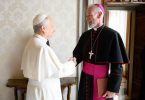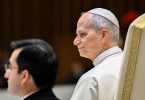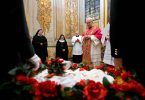
Maria Harries, a member of the Truth, Justice, Healing Council in Australia, is pictured during an interview with Catholic News Service outside the Synod of Bishops on the family at the Vatican Oct. 9. Harries, an observer at the synod, is on the council that deals with sexual abuse in the Catholic Church. (CNS/Paul Haring)
by Catholic News Service
VATICAN CITY (CNS) — As the Synod of Bishops on the family discussed ways to shepherd the Catholic flock, one participant was urging extra special care for Catholics who are either too angry, disillusioned or afraid to return to the fold because of clerical sexual abuse.
Abuse by clergy in Australia has led to a crisis of faith and a loss of trust in the church’s moral authority for “a very large number of people,” said Maria Harries, who is a member of the Truth, Justice and Healing Council of the Australian Catholic Bishop’s Conference and is an observer at the synod.
A significant number of people no longer go to church “because of the abuse and we have to work out ways to deal with that,” she told Catholic News Service Oct. 9.
Because many survivors come forward in their 50s and 60s, their trauma not only rocks their older parents or spouses, but also their children and grandchildren, passing on shock waves to multiple generations and extended families and friends, she said.
“So how do you address now a community of pain, a community of agony and a community of trauma?” she asked.
The fallout also extends to religious congregations that have been accused of doing nothing or not enough to address abuse.
The men and women religious who have “always lived good lives and who feel terribly tainted and embarrassed and traumatized by what their brothers have done” are also shattered or disoriented, she said. “Their emotional distress is quite palpable,” making them “another set of victims” that needs recognition and a pastoral response.
With 40 years of experience helping those who serve people affected by abuse, mental illness and other disadvantages, Harries said she wants her presence and voice at the synod to represent the “many thousands of people who find it hard to belong to the church.”
While the synod fathers want to encourage and promote families who are living out their Christian faith, Harries said there is also “a deep awareness of the pastoral needs of those who haven’t managed to achieve perfection or even near perfection.”
“What I see is the healing, the total healing that occurs when people care deeply and have no intention to do anything other than to love. I see the healing in that. And that gives great joy,” she said.
The Christian faith can offer real help to people who have suffered abuse or other injustices, she said, because it is built on deep respect for and the protection of human life and dignity. Acknowledging the “inadequacies of the human condition” also offers “a great foundation for acknowledging pain,” sin and the need to walk life’s journey together “for a very long time.”
Harries said that many people affected by abuse that she works with “don’t ever want to set foot in a church again.” However, there are many others who experience the church as “a lifeguard, a beacon and a traveling companion all their lives.”
She said the church has not set up enough services and care for survivors of abuse. It’s not clear how to ensure quality and effective services worldwide, she said, but some kind of “loose template” needs to be offered with best practices and tools that can be adapted for other cultural contexts.
One way the universal church is offering some general guidance is through the Pontifical Commission for the Protection of Minors, which Pope Francis established in December 2013.
Made up of 17 members from five continents with direct experience and expertise, this papal “think tank” advises the pope and bishops’ conferences with workshops and seminars.
Commission members, who met Oct. 9-11 on the sidelines of the synod, are increasingly becoming a resource for local churches worldwide for developing effective programs, according to a press briefing Oct. 12.
One member, Gabriel Dy-Liacco, a psychotherapist and pastoral counselor, said the bishops have to lead the way with “personal conviction” and pool the national conference’s resources to help local dioceses. But then it takes the laypeople who work in the needed fields of policy, law enforcement, judicial systems, social services, education and pastoral outreach to make it work, he added.
For example, in the Philippines, where Dy-Liacco was born and lives, the church led the fight against corruption by spreading the battle cry down to the families, educating them and urging them to take responsibility and action.
Another member, Kathleen McCormack, told CNS that “anybody can write a policy, but it’s how it is taken up and how people understand it and how they own it as a community” that spells success or failure.
McCormack, who spent decades helping Australia’s dioceses provide essential social services and counseling, said families and children need to learn a “culture of safety” — that is, what is appropriate and inappropriate behavior between an adult, including a family member, and child, and teaching the child to go for help when there are doubts or concerns.
She said the church must acknowledge abuse exists, admit when it did occur with its members, always be understanding of victims and “open its arms to other people that come forward” with accusations.
Harries said that when it comes to abuse and broader problems facing the family, what people need is not a question of “tampering with doctrine,” but rather deeply understanding the lived experiences of “mere mortals.”
“There are many successful people who have made the grade, almost to sainthood perhaps, but there are many more who Jesus would know, who we all need to walk with and we not only represent (them) we are them,” she said. “We are the deeply flawed people who need to work together.”






